Nicholle Johnson is a gamer who loves playing VHS, Valheim and Halo. She loves being a part of a community of gamers who share her passion. Connecting with another person over that shared experience brings her joy.
The 27-year-old doesn’t have much time for gaming though. She’s a full-time behavioral therapist at a small clinic in Nevada helping children who are autistic or who have other developmental needs. When she leaves at the end of the day, she heads to her second job where she’s a nanny for three kids, five nights a week. She needs the dual income to pay for the dental care she’s dreamt of her whole life—dental implants.
Nicholle does have close friends and family who support her. But, she was seeking a group of people who truly understand what she lives with day in and day out as someone affected by ectodermal dysplasia. She longed to connect to a community that has a shared understanding of what it’s like to always smile with your lips closed so people don’t see your missing teeth. Who know how frustrating it is to visit dentist after dentist trying to find someone who actually wants to treat you—someone who will work with you on a long-term treatment plan. Are there adults out there who know the pressure of trying to find more than $30,000 just so you can have teeth to bite into chicken with?
Searching for Her Village
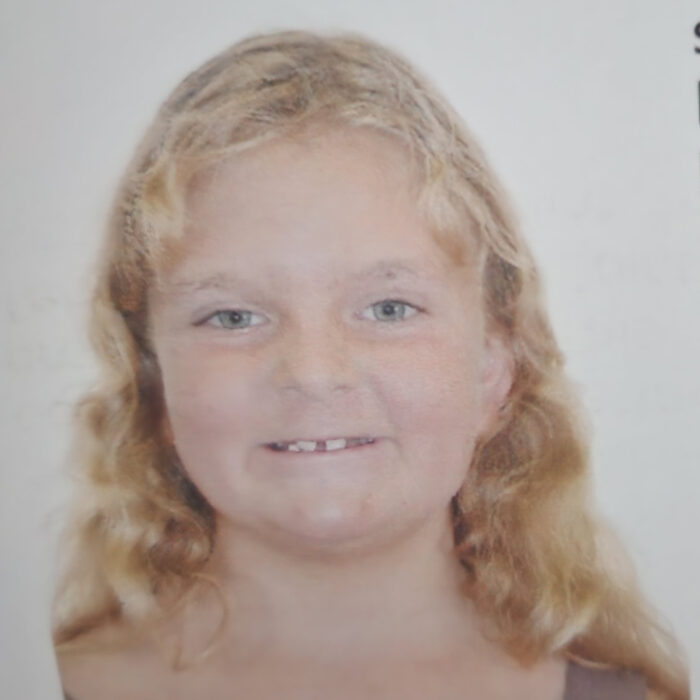
When she was growing up, her friends showed her empathy, which she appreciates. But Nicholle said they really couldn’t understand—not having walked in her shoes. She shut others out at times, thinking, what is there to talk about? Other times, she didn’t share her feelings as she didn’t want to burden them. She felt so alone.
By her mid-20s, Nicholle was ready emotionally and financially to pursue the dental implants she had always wanted. She also was ready to find and talk to someone who was affected by ectodermal dysplasia, the rare condition that causes her to have missing and misshapen teeth. The kids with autism she helped every day had a community. Surely there must be a community for her, too.
A search on Google quickly landed her on the National Foundation for Ectodermal Dysplasias (NFED) website. She devoured the information there. She then realized there must be families talking about these issues.
Nicholle headed to the NFED’s Facebook groups where she joined the one for hypohidrotic ectodermal dysplasia (HED), the type that affects her. Finally, she didn’t feel alone. Here was the community she had longed for.
I needed to talk to people like me. People who I could be real with. Where I could say, ‘this sucks’ and they get it.
– Nicholle
Sharing Her Experience
So far, she’s been reading others’ stories and parents’ questions. It struck her that she has information that could help them understand what their child may be going through.
“When I was growing up, I hated discussing my disorder with other kids. It sucked and it was none of their business. When I started getting teeth, I felt better about myself. Now, I would go back and tell my 14-year-old self, ‘It’s going to be ok.’”
Since she got her first top partial denture at 14 and the bottom partial at 20, her confidence has grown. But, she still finds it hard to smile and show her teeth.
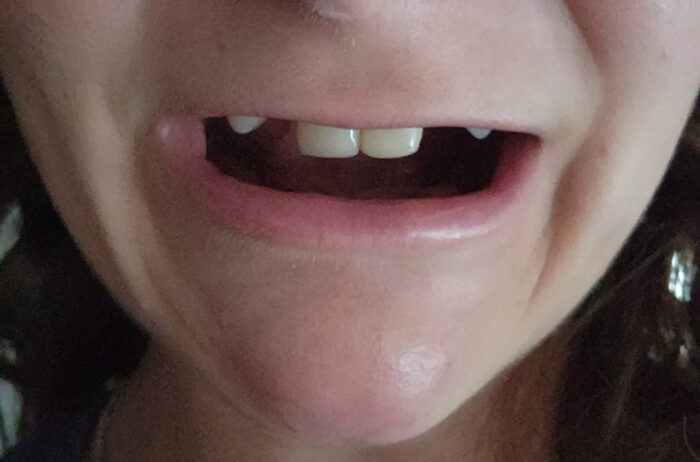
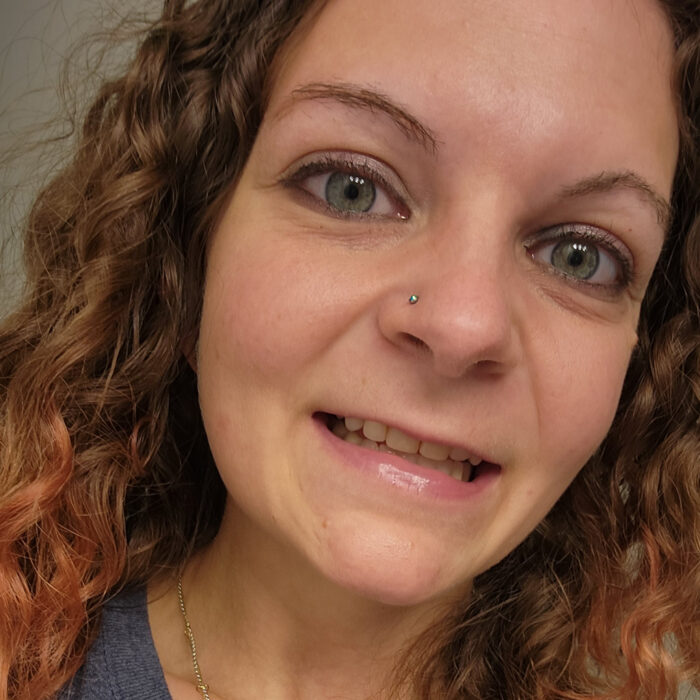
“Friends say, ‘You should smile more.’ I don’t want to smile. It’s not my body language. I paid money to have a better smile, but I still don’t do a full smile. I don’t show my teeth. I avoid it. But, I want to feel confident enough to smile around others.”
The Emotional Side of Ectodermal Dysplasia
On many days, the melancholy gets to her.
“I get sad,” Nicholle says. “I wish I didn’t feel that way, but I still get sad that I’m going to have to deal with ectodermal dysplasia for the rest of my life. But, I’m getting the best solution—which is my dental care. I’ve come to accept it, and it has made me a better person for it.”
To care for herself on the sad days, Nicholle hits the gym. She refers to herself as a gym junky and loves to lift weights. “I realized I love it so much because it gives me some control over the way I look. Sometimes with HED I feel like I have no control over the way I look, so it feels nice to have an ‘input’ in that.”
She says humor also helps her cope on the hard days.
“I haven’t been able to chew gum since I was seven years old because it was too sticky. Same with fudge or other sticky candy. Gum is such a social thing. People offer it to me, but I can’t have it. I thank them for the offer and for including me. I should be able to chew gum! I try to find the humor in these moments. I can’t wait to get my teeth just so I can chew gum like other people do!”
Finding Her Dental Dream Team
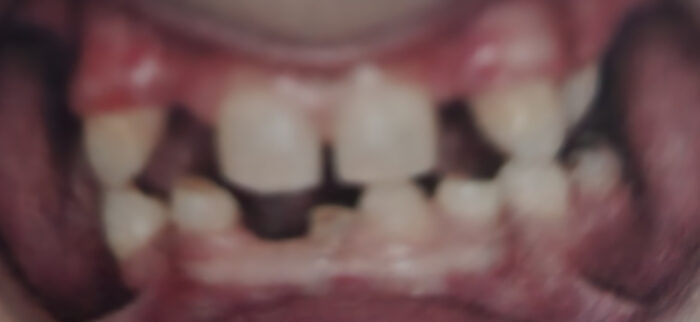
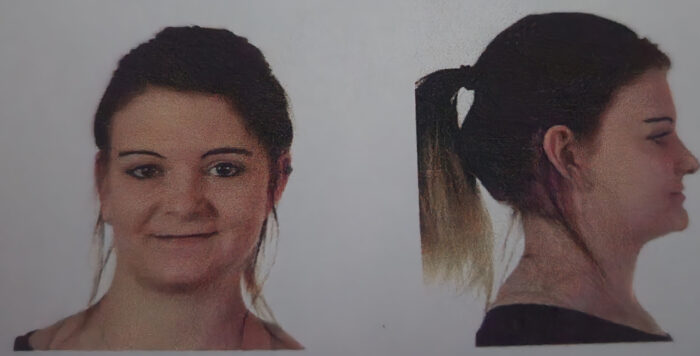
Nicholle says she experienced a series of traumatic events in her dental care journey as a child. She had six caps placed when she was five and had other work as she grew. Her mom, Susan, explored solutions and wanted to get her started on dental implants.
“I was scared and didn’t want to do the treatment at the time. My parents respected my decision.”
Today, Nicholle is thrilled with her dental team. But she wasn’t always that lucky growing up. Her family moved often and the dentist search would begin. It was always trial and error. Some said, “I can do this, but not this. Or, I can do this but there’s no guarantee that it will work.” Others simply refused to treat her or to learn, she says.
“Since I was 18, I have done this without my parents’ help. As a teenager, I didn’t know what I was doing and took a break on my dental care. Then right before COVID, I decided it was time. That’s when I found the NFED.”
“It took a while to find my current dental team. When I met with them, they were eager to help and to find solutions and be there for me. It was comforting. They care. They were also honest. He told me it would take a long time and cost a lot of money. It was heartbreaking to hear.”
Paying for Her Smile
Initially, she pushed off the treatment due to the cost. Finally, at 26, she began. She used the NFED insurance toolkits to try and get the care covered by her medical insurance. Despite her work, her insurance continues to deny her claims. So far, Nicholle has had four implants placed in her upper jaw, which have cost her about $19,000 out of pocket.
I had to use my personal savings account, two credit cards, care credit, and set up a payment plan to pay off $5,000 in seven months. Dental insurance does not cover the type of procedures I need to live a better life. Medical insurance will not help with billing due to it being deemed as a ‘cosmetic’ surgery. Tell me, is eating cosmetic? Being in pain? How about the fact my jawbone is deteriorating? I have had to pay for this on my own because this is not considered a medical procedure.
– Nicholle
Fighting for Benefits
“I watched an NFED video on YouTube where a boy spoke at an NFED Family Conference and talked about how someone could be in a car accident and lose their teeth and get benefits, but he couldn’t. I have always said the same thing!”
Nicholle will have the third and fourth phases of her treatment later this year. She says she wiped out her savings for the first part and continues to work two jobs to pay the installments. She has no idea how she will pay for the bridge. But, she’s determined.
“The fourth part—getting the bridge to attach to my implants—is going to cost approximately $26,000 out of pocket. I don’t understand how anyone could expect to pay this.”
Nicholle is thrilled to know that the NFED is working to get federal legislation passed that would mandate benefits for dental care due to a congenital anomaly.
“ELSA (Ensuring Lasting Smiles Act) is my new favorite thing! I’ve been telling everyone about it and advocating for it,” Nicholle said.
The Best Part of a Community
Nicholle mentioned that she has other HED symptoms including thin hair that doesn’t grow past a certain point, thin nails and overheating. But it’s her teeth that have proved the most challenging.
She can’t wait to be able to bite into chicken, bread or jerky, things that are harder and have texture. She’s never been able to tear those foods because her teeth weren’t strong enough.
Nicholle says the best thing about finding the Foundation has been knowing she’s not alone.
“It’s difficult sometimes, and sometimes I feel really alone in this journey. It’s been nice lately to hear others in the Facebook groups talk about things I go through on a daily basis.”
Her dream for herself is to be happy and successful.
“I want to be content with what I have been given.”
Share Your Story
I still have glued in dentures from 2013. Still have them, was advised to get permanent implants at 22 yrs. But we are not financially capable to afford this treatment, we live in zambia in a one working household.
Hi, Josuha. Thank you for sharing some of your dental journey with us. We know the cost of dental care is a barrier to treatment for many individuals with ectodermal dysplasias and are sorry to hear that this is the case for you. We wish you all the best!
I hear you. Thank you for commenting!
I have had partials for years, and want something permanent. It’s been hard and I’m very much in debt.
Thank you for understanding.
Excellent article! Thank you Nicholle for sharing your story, and Jodi for writing it so well. I appreciate Nicholle’s honesty with the tough things she’s been through. I have ED as well and received my first set of crowns/bridge about 25 years ago. Even though the aesthetic result was quite bad (and to this day I remain very self-conscious of my appearance and avoid laughing/smiling in front of people) I’m still dreading the day they’ll need to be replaced, as it will be several tens of thousands of dollars. When I first got them they were covered in part by a government program that existed at the time (in Ontario, Canada) and the rest was covered by my parents. The next set will be all on me. $$$igh!! Anyway, thanks again for sharing your journey. Best wishes with the rest of your dental journey!
Thank you!
I feel you. It has been a fight every day lately with insurance.
I am still learning so much about everything with HED.
Thank you for your story. I have 2 kids who are missing 12+ of their adult teeth and they will both need implants. We are not at the point yet where they have adult mouths and are just hoping they can keep the baby teeth as long as possible. We have been making sure their diagnosis of ectodermal dysplasia is in their medical records, so we can try to get insurance to help pay when the time comes. It will be a long road ahead for both of my kids also. It does really suck and I am sorry you all also have to deal with this. Great to be part of this community with other’s who understand.
Thank you!
I wish ypu the best luck. I thoughti had every in the books to help with insurance. There’s not a week that goes by recently that I am trying to figure out how to handle this battle.
Thank you, Nicholle, for sharing your story. I recognize a lot of our daughter’s experience here. She’s only 10, but a lot of this is familiar — the close-mouthed smile, the difficulty in sharing her feelings or her experience with Ectodermal Dysplasia with friends. She has never wanted to pursue interventions in the past, and we’ve respected her wishes. Recently, her feelings seem to have changed, and we’re beginning to explore the possibilities While implants are a way down the road, we know there are other options in the meantime. Your story reminded us is that hers is a complicated journey, and that the connections the NFED helps foster are immensely valuable.
It is a very personal journey. I found even when I tried to open up, it’s difficult to say the right words. Respecting her journey is so important. I’m glad you can support that!
Nicholle, I read your story and had to share mine. You are the FIRST person I’ve ever read about that knows what I’ve been dealing with my entire life. I know exactly how you feel. I’ve been dealing with this for 65 years.
I appreciate your support. It’s been a journey that seems to never end.